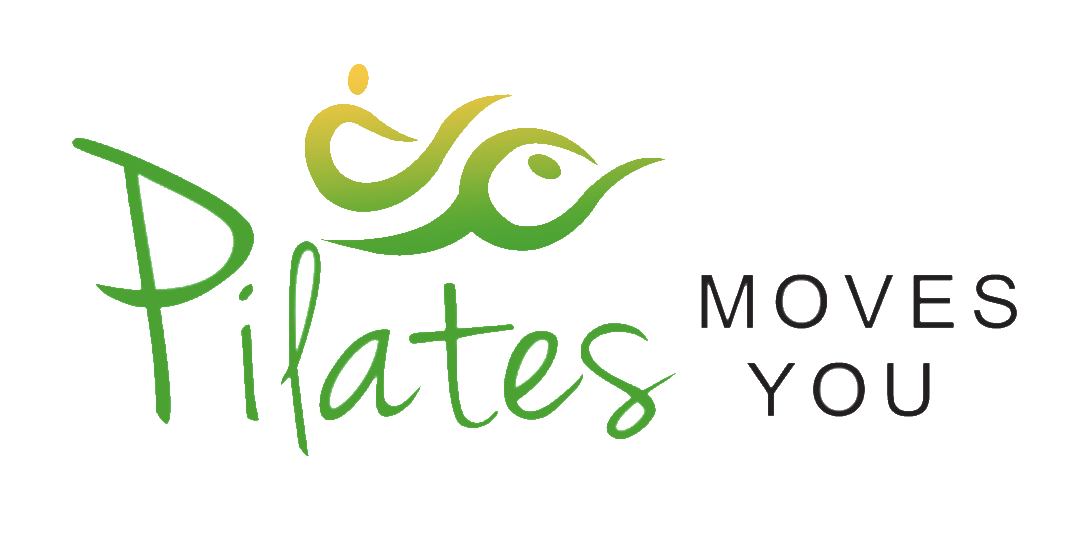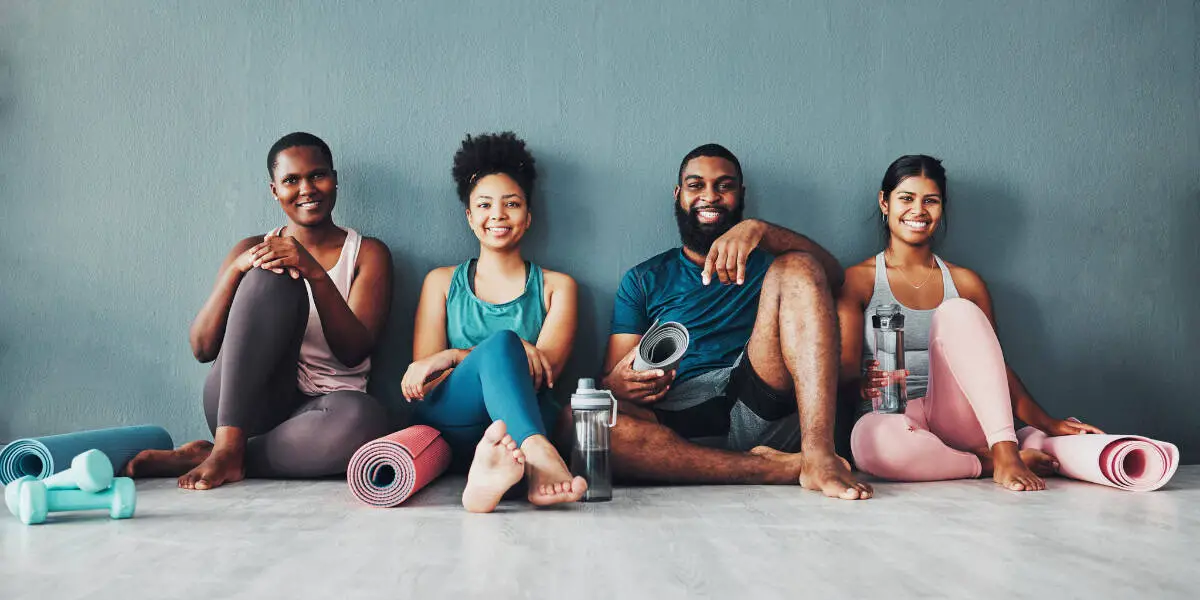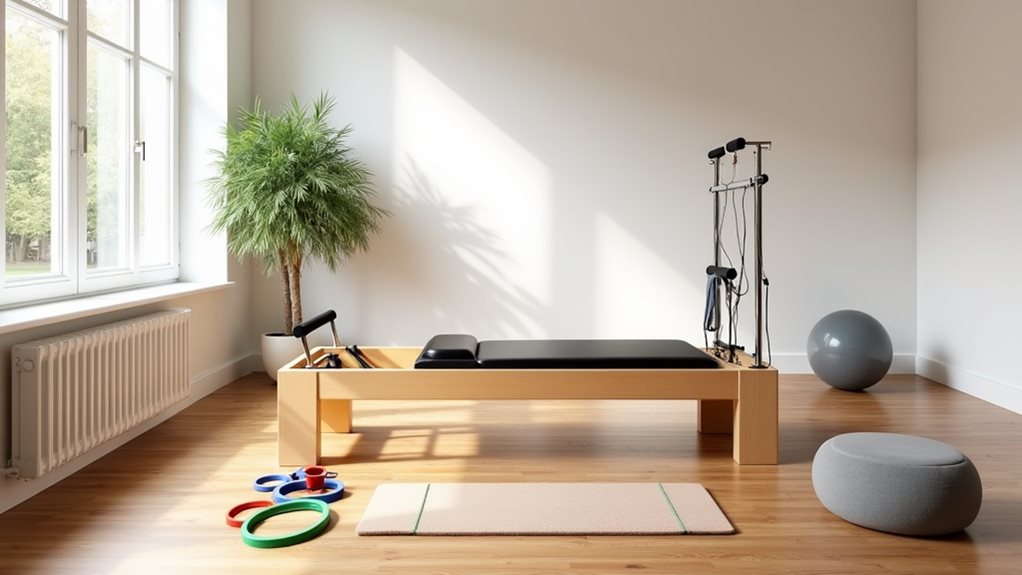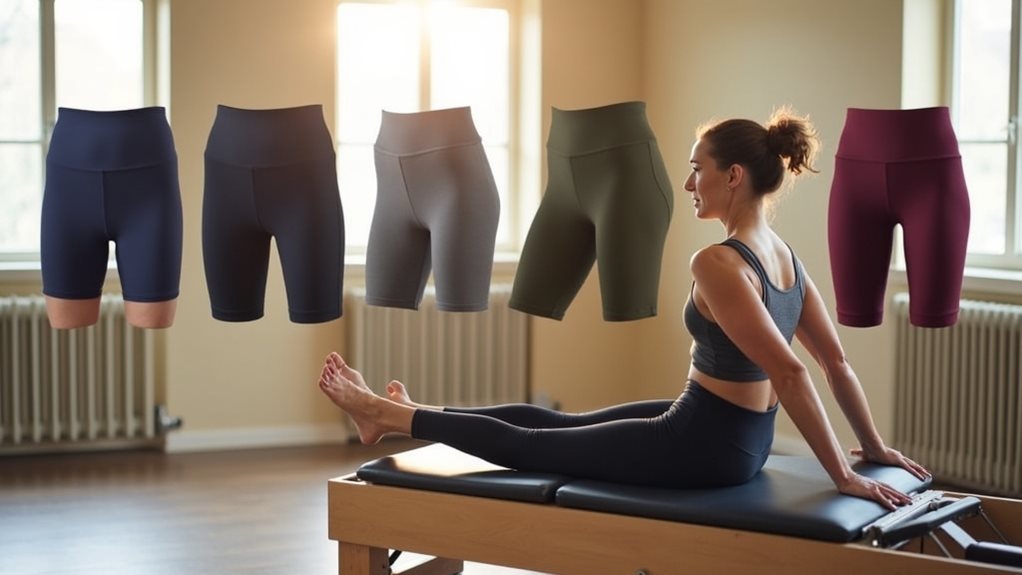Pilates has become increasingly popular in recent years, not only as a physical exercise but also for its potential mental health benefits. But why do so many people feel so good after a Pilates session? What is it about this low-impact workout that can have such an impact on our mental state?
After a Pilates session, you can feel so good because of the endorphins released during exercise. Pilates combines stretching and strengthening exercises that help to improve posture, increase flexibility, and strengthen your core muscles. All this helps to create a feeling of well-being and relaxation in your body.
As well as being a fantastic system for building strength, flexibility, and balance, Pilates can also be a great way to improve your mental health and wellbeing. In this article, we’ll explore how Pilates can help you reduce stress, boost your mood, and promote positive thinking.
As a Pilates instructor, I’m passionate about helping my clients achieve their goals by establishing healthy habits that last a lifetime. Regular practice of Pilates helps to increase your body awareness while calming the mind. It’s a gentle yet effective form of exercise that can help to reduce stress and anxiety while improving focus and concentration.
Whether you’re looking for ways to reduce stress or simply want to feel more connected to your body, Pilates is an excellent choice. With consistent practice, you’ll start to notice increased energy levels and improved mental clarity. You’ll also gain a greater sense of control over your emotions and thoughts as well as enhanced self-confidence along the way!
Benefits of Pilates for Mental Health
It’s no secret that Pilates is an excellent way to improve mental health. As the old saying goes, when your body feels good, your mind does too. Practicing Pilates can help you relax and reduce stress, while also increasing self-esteem and confidence.
The physical benefits of Pilates are just one side of the coin; the emotional benefits are just as important. Research has shown that regular practice of Pilates can improve mood and reduce symptoms associated with depression and anxiety. This is due to the calming effects of deep breathing and mindful movement, as well as improved posture and balance in the body.
The combination of strength building, flexibility, coordination, core stability, and relaxation all play an important role in creating a powerful impact on improving mental health. With regular practice, you’ll be able to reap these incredible benefits while finding inner peace through movement.
As we move forward into understanding how different types of Pilates can benefit our mental health even further…
Types of Pilates
Pilates is a great way to improve mental health. It is a form of low-impact exercise that helps the body and mind to relax and unwind. There are many different types of Pilates, so there is something for everyone.
The three main types of Pilates are Mat Pilates, Reformer Pilates, and Apparatus Pilates.
Mat Pilates is a series of exercises done on the floor, with no additional equipment needed.
Reformer Pilates is done on an apparatus called the Reformer which adds resistance to the exercises.
Apparatus Pilates uses other pieces of equipment such as Pilates bar, resistance bands, or ballto add variety and challenge to the workout.
No matter which type of Pilates you choose, you will find that it can help to improve your overall mental wellbeing. All forms of this exercise promote circulation throughout your body, helping you to feel calmer and more relaxed. It also helps strengthen your core muscles and improve flexibility, both mentally and physically.
By finding the right type of exercise that works best for you, you can begin your journey towards improved mental health today!
How to Start Practicing Pilates
Getting started with Pilates is easy! All you need is an open space, comfortable form fitting clothing and a mat.
Depending on the type of Pilates exercise you are doing, you may also need some equipment such as a stability ball or resistance bands.
Before beginning any Pilates routine, it’s important to warm up your body with some light stretching and breathing exercises. This helps to prepare your muscles for the workout and prevents injury.
Once you’re warmed up, focus on your movements and keep your core engaged throughout the entire routine.
If you’ve never done Pilates before I strongly recommend attending a class with a qualified instructor who will be able to teach you the basics safely, modifying them as needed depending on your condition.
Pilates works best when it’s done slowly and with control. Pay attention to the details of each movement and focus on achieving proper form. This will help ensure that you get the most out of each exercise and maximize its benefits for both physical and mental health.
Finally, don’t forget to take time for relaxation at the end of each session. A few minutes of deep breathing can help bring your body back into balance after a good workout.
With regular practice, these relaxation techniques can become an essential part of your daily routine – helping you achieve greater physical strength, mental clarity, and emotional stability in life overall.
These steps can set you off on a journey towards better mental health through Pilates – next we’ll explore how this mind-body connection works to create positive changes in our lives.
Mind-Body Connection With Pilates
People often overlook the power of Pilates to improve mental health. As Joseph Pilates said, “Physical fitness is the first requisite of happiness.” But what many fail to understand is that physical fitness can also be a pathway to emotional wellness. By connecting the mind and body in a mindful manner, Pilates can help reduce stress, increase focus, and promote overall wellbeing.
The practice of Pilates sets it apart from other forms of exercise by intentionally focusing on breath and movement. This not only strengthens the muscles but also calms the mind.

The combination of controlled movements and deep breathing helps to develop concentration, balance emotions, and increase self-awareness. It is no surprise then that many practitioners view their Pilates practice as a form of meditation or spiritual awakening.
By combining proper technique and posture with mindfulness, Pilates can lead to improved mental health outcomes. The combination promotes relaxation while improving strength and coordination – all without sacrificing your emotional wellbeing. With regular practice, you may find yourself feeling more energized, present in the moment, and happier with life overall.
Proper Technique and Posture
Proper technique and posture are essential when doing Pilates. It’s important to have a good understanding of proper body alignment before trying any exercise. This will help prevent injury, allow better movement and improve the effectiveness of each exercise. In order to achieve good posture, there are three main things to keep in mind: alignment, breathing, and control.
Alignment is the foundation of successful Pilates practice. The correct body position should be maintained throughout each exercise, with the spine held in neutral alignment and the head aligned above the chest for optimal results.
Breathing is also key when performing Pilates exercises. It helps keep your movements steady and consistent, as well as providing oxygen to your muscles, so they can work efficiently. Focus on inhaling deeply through your nose during challenging parts of a movement, then exhale slowly while you return to starting position.
Finally, focus on control throughout each exercise – not speed or force – as this will ensure you get the most benefit out of each move. This means concentrating on maintaining proper form rather than rushing through an entire sequence. Focusing on slow and controlled movements will also help you build strength over time and increase flexibility.
By maintaining proper technique and posture while performing Pilates exercises, you’ll be able to reap all the benefits that come with it such as improved mental health and stress reduction – which we’ll discuss further in our next section.
Pilates and Stress Reduction
Ah, proper technique and posture. We’ve all heard the age-old adage that practice makes perfect, and when it comes to Pilates, this is certainly true! While mastering your form may take some time, there are many mental benefits to be gained from the process. Now let’s move on to how Pilates can help you reduce stress.
The very nature of Pilates is calming; the focused breathing and mindful movements offer an escape from everyday worries. Focusing on personal alignment and core control allows you to clear your mind and step away from outside stressors. This mental clarity can help reduce feelings of anxiety and depression, allowing for a more positive outlook on life.
The sense of community also plays an important role in reducing stress levels. From classes with other practitioners or simply connecting with like-minded people through Pilates forums or blogs, having support from fellow enthusiasts can do wonders for your mental health. By immersing yourself in the world of Pilates, you will find a place where you can feel connected and relaxed.
Pilates offers a holistic approach to physical and mental well-being that has been proven to reduce stress levels while increasing self-confidence and body awareness – benefits that will last far beyond just one session! As we make our way into connecting with other practitioners, we’ll explore how socializing during Pilates classes can further reduce tension while promoting joy in movement.
Connecting With Other Practitioners
Pilates is an incredibly beneficial form of exercise that can improve mental health. But one of the best ways to get the most out of your Pilates practice is by connecting with other practitioners. Doing so allows us to share our knowledge and experience, while also providing support and encouragement.
When we connect with other Pilates enthusiasts, not only do we benefit from their expertise, but we also build a sense of community. We are able to learn from each other, which can help us become more mindful and aware of our own body’s capabilities. It’s great for gaining perspective on how others practice too – by understanding different approaches, you can work towards finding what works best for you.
Additionally, having someone else around can make it easier to stay accountable and motivated on your journey as well!

Without any external pressure, some days it may be difficult to stick with your routine – but having another person there who’s just as committed as you can be a huge help in those times. All in all, connecting with others can be incredibly rewarding; it has the potential to deepen your appreciation for Pilates and create meaningful bonds.
By joining forces with other practitioners, we open ourselves up to new possibilities in terms of both learning and growth – ultimately allowing us to reap even more mental health benefits from our practice.
Combining With Other Forms Of Exercise
Imagine your body and mind as a garden. If you only water it occasionally, the growth of your mental and physical health can be stunted. As a Pilates instructor, I like to use this analogy to emphasize the importance of combining different forms of exercise into a regular practice.
By combining Pilates with other forms of exercise, such as strength training or cardio, we can nourish our minds and bodies in different ways. For example, strength training provides us with an opportunity to use heavier weights and build muscle tone. Cardio helps us increase our heart rate and burn calories for energy. Combining both of these activities with Pilates can help create balance in our lives that will promote physical and mental wellbeing.
At the same time, while the combination of various activities is important, it’s just as crucial to find an exercise routine that works for you personally. That way, you can ensure that each session is tailored to meet your individual needs and preferences.
This will help keep you motivated and engaged throughout your journey towards improved mental health. Transitioning into the subsequent section about sustaining mental health through regular practice, it’s essential to consistently prioritize self-care in order to achieve maximum benefits from any form of exercise or activity.
Sustaining Mental Health Through Regular Practice
Sustaining mental health through regular Pilates practice is essential for lasting results. Regular practice helps to keep the mind and body in balance and can help reduce overall stress levels.
By practicing Pilates regularly, we can become more mindful of our bodies, allowing us to better identify physical tension and stress. With this newfound awareness, we are able to take steps to address these issues before they become a problem. This may involve changing lifestyle habits or simply taking time for ourselves each day.
Pilates also provides an opportunity to focus on the present moment. With the combination of movements and breathwork, it allows us to let go of our thoughts and worries, allowing us to relax both mentally and physically. By making Pilates part of your daily routine, you’ll be investing in your mental wellbeing for years to come.
Frequently Asked Questions
What Equipment Do I Need To Practice Pilates?
When it comes to Pilates, the equipment needed depends on the type of practice you are looking to do. For practicing at home, you can use a Pilates mat, resistance bands, and a fitness ball. All of these items are relatively inexpensive and can be found in most sporting goods stores or online. If you’d like to take classes in a studio setting, the equipment will vary from studio to studio; however, most will have mats, reformers, and other machines for your use during class.
No matter what kind of equipment is available to you when practicing Pilates, it’s important to remember that the exercises themselves should be your main focus. You don’t need any fancy equipment or gadgets; all that matters is that you execute each exercise correctly with proper form and technique. When done correctly, Pilates exercises can help build strength and improve flexibility while also helping to reduce tension in your muscles and joints.
At the end of the day, no matter what kind of Pilates practice you choose – whether it’s at home with minimal equipment or at a studio with more specialized tools – what matters most is that you’re engaging in movement that feels good for your mind and body. With dedication and consistency, you’ll soon see how powerful this form of exercise can be for improving your overall wellness.
Are There Any Specialized Classes For Mental Health Benefits?
Pilates is a great way to improve mental health, but do specialized classes exist to help you with this? Yes – there are several styles of Pilates classes that can be tailored to the individual’s needs. For example, an instructor may focus on breathing techniques and mindfulness through the movements.
These classes can have a powerful impact on one’s mental well-being. Here are some of the benefits:
- Increased self-awareness and understanding of one’s body
- Improved focus and concentration
- Reducing stress levels and improving moods
As an experienced Pilates instructor, I can assure you that a tailored class will give you the best results. Depending on your current state of mind, we can adjust how long each pose is held for or how quickly the moves are executed.
We can also look into different types of music to set the right atmosphere or use guided imagery to direct your thoughts in a positive direction. There is no wrong way to practice as long as it feels comfortable for you.
This type of class gives individuals an opportunity to take control over their own mental health journey and find new ways to stay balanced throughout their day-to-day life. With regular practice, they can get back in touch with their bodies and minds, helping them become more centered and relaxed overall. It’s amazing what a few simple stretches and mindful movements can do for our overall sense of wellbeing!
Is Pilates Suitable For All Levels Of Fitness?
Pilates is a great workout for all fitness levels. Whether you’re just beginning your fitness journey or are an experienced athlete, Pilates can provide a low-impact, full body workout. Here’s what makes it suitable for everyone:
- Low Impact Movements: Pilates focuses on low impact movements that help to build strength and stability without strain on the joints.
- Modifiable Exercises: Most of the exercises in Pilates can be modified for different levels of fitness, making it easy to find the perfect intensity for you.
- Breath Work: Breath work is a key component of Pilates and helps to increase mindfulness and focus throughout the duration of your practice.
- Strengthening Core Muscles: Core muscles are essential for balance and stability, and Pilates works to strengthen these muscles with each movement.
No matter your level of fitness, Pilates offers benefits that help improve physical and mental health. You’ll gain strength, flexibility, balance, coordination and core stability while learning how to move in better alignment with your body – all through low impact movements! Plus, the breathing techniques used in Pilates can help reduce stress and anxiety levels while increasing energy levels throughout the day.
It’s no wonder why so many people are turning to Pilates as part of their regular exercise routine! With its versatility and ability to be tailored to any fitness level, there’s something here for everyone – from beginner to advanced athletes! So why not give it a try?
Conclusion
Pilates is an effective way to improve your mental health and wellbeing. It’s a low-impact form of exercise that requires minimal equipment, so anyone can get started on their Pilates journey. Not only does it strengthen and tone the body, but it also helps you to relax, focus and feel energized.
As a Pilates instructor I’m often asked about the differences between Pilates and Yoga. While both forms of exercise work to improve flexibility and strength, Pilates is more focused on core strength which helps build balance and stability in the body – something that can be very beneficial for mental health.
So if you’re looking for an enjoyable form of exercise that will help you manage stress, increase your energy levels and improve your overall wellbeing, why not give Pilates a try? With its low impact nature, there’s no need to worry about over straining yourself or injuring yourself. And who knows? You may even find that you enjoy it! So what are you waiting for?




